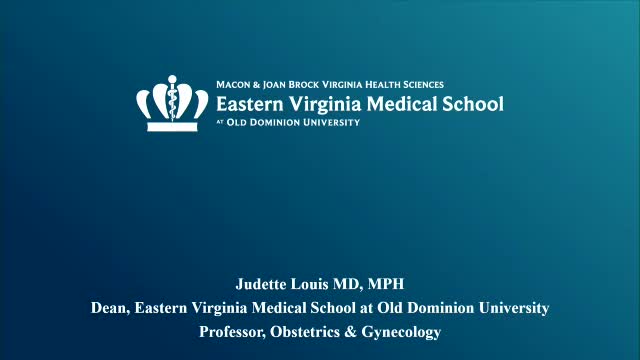EVMS dean tells Commission sleep apnea in pregnancy doubles risk of preeclampsia; panel adds topic to subcommittee
Get AI-powered insights, summaries, and transcripts
Subscribe
Summary
Dr. Lewis, dean of Eastern Virginia Medical School, told the Commission on Women—s Health that obstructive sleep apnea in pregnancy is associated with higher risks for both mother and baby, including about double the risk of preeclampsia.
Dr. Lewis, the new dean of Eastern Virginia Medical School at Old Dominion University, told the Commission on Women—s Health that her research shows obstructive sleep apnea in pregnancy is linked to higher risks for both mother and baby.
"I am the new dean of Eastern Virginia Medical School at Old Dominion University. I started September 1," Dr. Lewis said, introducing her work on sleep apnea. She summarized findings from multiple publications showing that pregnant people with sleep apnea are about twice as likely to develop preeclampsia and gestational diabetes and are more likely to have C-sections, pulmonary embolism, cardiomyopathy and higher rates of in-hospital death.
Her research team reported prevalence estimates of roughly 3–5 percent in younger, healthier pregnant people and as high as 20–30 percent in older or higher‑risk groups. Dr. Lewis said the evidence suggests the association is not explained entirely by obesity: "We were able to answer the question of whether it was something else," she said, noting studies that adjusted for obesity still found elevated risks.
The presentation described biological pathways that could account for these outcomes and wider societal costs of untreated sleep apnea. Dr. Lewis noted the principal screening challenge: pregnancy symptoms overlap common sleep‑disorder symptoms, and there is a shortage of sleep medicine specialists. She described current pregnancy screening as symptom driven and said that home testing devices exist but access and stigma remain barriers.
On clinical guidance she told the panel that published recommendations and her work support screening at least high‑risk pregnant patientsthose with preexisting hypertension, diabetes, cardiac disease or a body‑mass index above 40.
During committee questions, members asked how telehealth could help rural patients. Dr. Lewis described telehealth as useful for risk screening and specialist consultations and for directing patients to hospitals with appropriate levels of neonatal or maternal care. She also urged better data collection, standard definitions in maternal mortality reviews and postpartum care continuity, including Medicaid extensions that have been associated with fewer emergency visits and more primary‑care follow-up.
After the presentation and Q&A, a commissioner moved to add "sleep apnea during pregnancy" to the commission—s Life Experiences subcommittee. The motion was seconded and approved by voice vote; the chair said the subcommittee would include Dr. Lewis— recommendations in its work.
Why it matters: maternal mortality and morbidity in Virginia show persistent disparities and rural shortages of obstetric care. Dr. Lewis emphasized that many maternal deaths are preventable with timely screening, access to appropriate levels of care and improved postpartum transitions to primary care.
What the commission heard: discussion centered on screening logistics, workforce shortages, telehealth as a triage and access tool, and potential policy levers such as data standardization and Medicaid postpartum coverage to reduce preventable complications.
